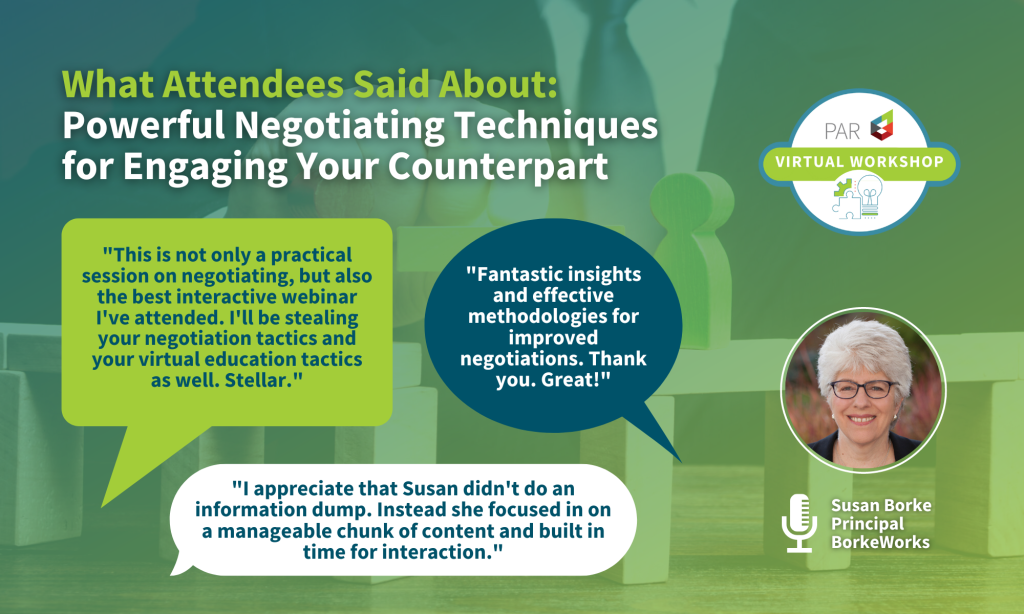Ways to Win: Sharpening Negotiation Skills to Get Results

By Shannon Reid
Planning out who will cook dinner this week- you or your partner. Agreeing on a curfew for your newly licensed teen driver. Managing the outfit choice of your style-obsessed seven year old the morning of school picture day. We conduct all of these negotiations each day in our personal life - some quickly and others over time.
As revenue generators, the professional negotiations that we undertake can determine the success of our organizations. Often, negotiating is viewed as a skill that a person either has or doesn’t; however, this is not the case. Susan Borke, Principal at BorkeWorks and an expert in the art of negotiating, says negotiations can and should be practiced for optimal success. She joined PAR on a recent virtual workshop to provide her insight into improving negotiation skills.
Prepare to Win
Borke notes that there are two major components to preparing prior to negotiating: research and rehearsal. While most of us are aware that research is crucial, we may forget to rehearse during our negotiation preparation. As you prepare to rehearse, consider what you do and do not have control over.
“We cannot control our thoughts and emotions, but we can control our behavior,” Borke says.
It is vital to consider what types of triggers may affect your behavior and have a plan to deal with these before the negotiation begins. Techniques such as deep breathing or using a special photo or memento to center yourself can help control potentially negotiation-killing reactions.
Manage Your Mindset
In order to approach a negotiation correctly, Borke recommends thinking about the differences in perspectives between you and your counterparty: “What are they seeing? How does it differ from your vision?”
Considering alternative viewpoints before the negotiating process begins can help to find beneficial common ground early. Your mindset should also be open to negotiating at any time. Borke reminds us that “anytime someone makes a request…that is an opportunity to negotiate!”
Questions are Key
Another key element of rehearsing is to plan the right type of questions that you will ask during the negotiation process. Try this trick: turn ‘why’ questions, which can put the counterparty on the defensive, to ‘what’ or ‘who’ questions.
For example, replace “why do you want this?” with “what outcomes would you most like?“. Reframing questions to focus on the ‘how’ or ‘what’ allows your counterparty to open up and provide valuable detail about their needs without feeling that they need to justify their position. Prepare general questions in advance that can be used in many scenarios; then, after researching your counterparty and their organization, modify those questions to be specific to the negotiation process you are currently working through.
Listen and Learn
Borke also recommends utilizing active listening techniques such as paraphrasing your counterparty’s words- this will ensure you are understanding each other’s point of view and will provide evidence of engagement in the conversation. Another common facet of strong negotiation skills is to practice mirroring; that is, repeating back the last 2 to 3 words your counterparty says during your conversation. While mirroring can take some getting used to, it allows the conversation to ‘breathe’ by building in brief reflections and time to expand on key ideas.
You may be thinking ‘sounds great, but HOW do I practice this skill?’ Consider the three ways that Borke practices her own negotiation skills:
- Use low-stakes situations: make your friends and family aware that you are in practice mode! Use techniques such as shifting to ‘what/how’ questions or mirroring in your daily life as a way to grow your comfort level with these approaches.
- Practice intentionally: in order to build in practice time, you need to get specific! What techniques will you practice? When will this practice take place and who will practice with you?
- Role play: engage colleagues in role playing negotiation scenarios. If you have a big negotiation coming up on the calendar, reverse roles and ‘play’ the part of your counterparty. What better way to understand their point of view than to walk in their shoes before your planned meeting?
Above all, remember that the best way to lessen nervousness in negotiations is to come prepared!

Full Virtual Workshop Recording Available
Watch the full 1-hour recording here for more negotiating tips from presenter Susan Borke. Borke’s years of experience at CBS and National Geographic provided extensive opportunities to hone the negotiation techniques she has been teaching to business professionals for over 30 years.